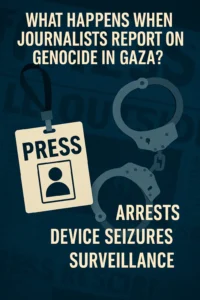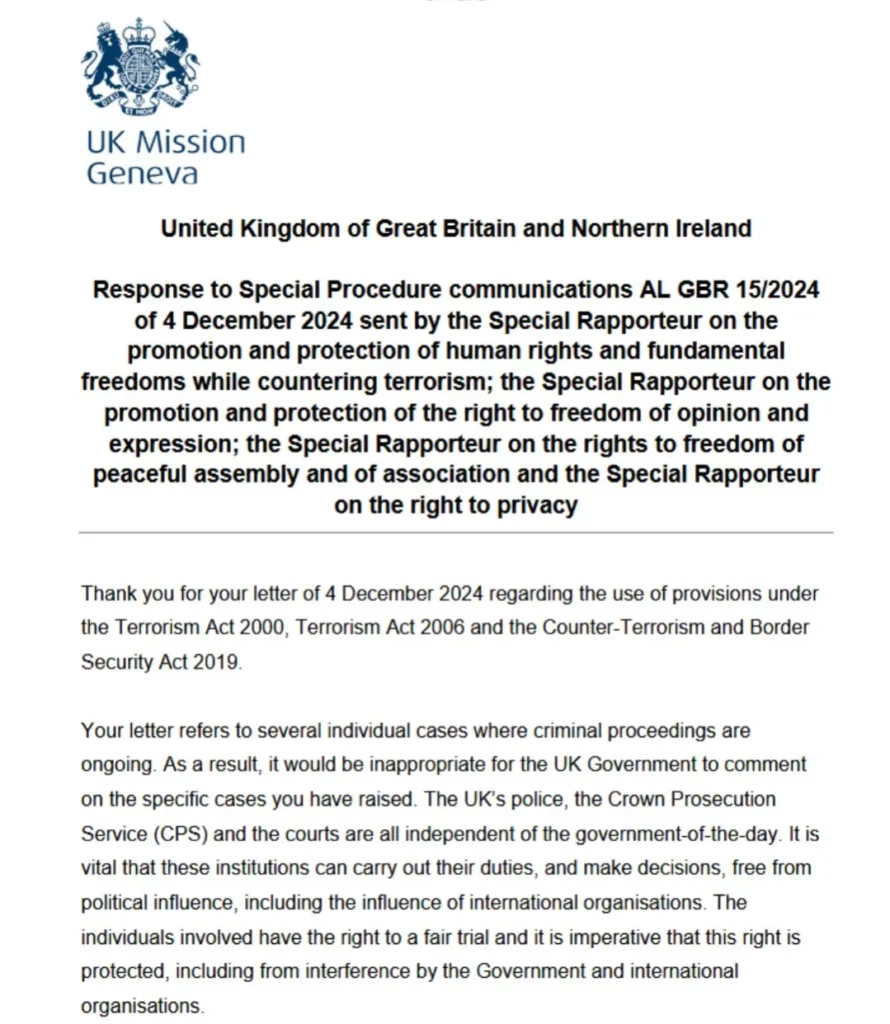Terrorism Charges for Telling the Truth: How Britain Is Silencing Journalists Who Report on Palestine
EUROPE, 2 Jun 2025
Sara Chessa | The Anti-Inhumanist - TRANSCEND Media Service
On the arrests and intimidation of journalists and activists carried out by the British state since August 2024, despite condemnation by international institutions.
28 May 2025 – Since August 2024, an alarming pattern of detentions, arrests and legal intimidation targeting independent journalists and activists has emerged in Britain. Members of the press and activists who report critically on and protest the Israeli occupation of Palestine and the war on Gaza, have found themselves in the crosshairs of expansive anti-terrorism legislation.
This is not an isolated crackdown; it is a full-blown assault on press freedoms, truth-telling, the right to protest and the public’s right to know.
Persecuting Journalists Reporting on Palestine
The timeline of this new chapter of repression against pro-Palestine journalists began with the arrest of British-Syrian independent journalist Richard Medhurst. On 15 August 2024, Medhurst, after landing at Heathrow Airport, saw six officers board the plane and escort him, in handcuffs, to a local police station where he was held incommunicado for almost 24 hours. He was arrested under Section 12 of the Terrorism Act 2000, accused of “expressing an opinion or a belief that is supportive of a proscribed organisation,” in his reports and social media. His electronic devices were confiscated and he was released on pre-charge bail and under investigation.
Post-arrest, Medhurst has faced ongoing surveillance and limitations on his ability to report, as well as understandable emotional distress. His journalistic equipment, including microphones, hard-drive adapters and headphones, remain in police custody. He has spoken about feeling silenced: “Palestine, the humanitarian crisis in Gaza remains the most pressing news story in the world. However, it seems that any statement can be twisted into an offence of the highest order.”
Medhurst’s persecution did not end in London. In February 2025, Austrian police raided his home in Vienna, allegedly at the request of British authorities. He was again detained, his home searched and police questioned him about his journalism and associations.
Following Medhurst’s August arrest in London, a new wave of repression began, when less than two weeks later, journalist and activist Sarah Wilkinson, known for her prolific and insightful updates on the situation in Gaza, had her home raided and was subsequently arrested. Sixteen or seventeen mostly plain clothes officers barged into her home in Bishop’s Castle, Shropshire, just after 7 am on the morning of 29 August 2024. Officers refused to show Wilkinson any warrants to search her home and was subjected to degrading treatment which included not being able to dress properly and prevented from taking her medication. After, balaclava-clad men searched her home, took money and her passport – which they did not declare – and left the place in disarray, with objects smashed. Worse, the urn containing Wilkinson’s mother’s ashes had been scattered around, which she had to subsequently scrape from objects and the floor. She was unable to retrieve a third of her mother’s ashes. As Wilkinson revealed on The Crispin Flintoff Show, the officers confiscated equipment worth £7,000 and £200 in cash. Wilkinson’s bail conditions initially included prohibition of travel and the use of her phone or electronic devices, including her television, which impacted her life enormously as she lives in a small village with only one shop. She described her experience as “horrifying,” and felt the “whole experience was meant to be as terrifying as possible.”
Days later, on 29 August 2024, Palestine Action’s co-founder Richard Barnard was charged under Section 12 (1A) of the Terrorism Act, for expressing opinions in two speeches for allegedly supporting a proscribed organisation.
Months later, Asa Winstanley, Associate Editor of The Electronic Intifada, experienced a similar fate, when counter-terror officers raided his home and seized his devices. Though not arrested or charged, Winstanley was placed under investigation and accused of violating Sections 1 and 2 of the 2006 Terrorism Act for his social media posts. On 27 May 2025, Winstanley reported that his devices were returned following a judge ordering that the raid of his home was unlawful. Winstanley said in the month following his arrest, the police had admitted their raid was unlawful.
David Miller, an academic, journalist and former professor at Bristol University, was detained at Heathrow airport in January 2025 after reporting on the funeral of assassinated Hezbollah Secretary-General Hassan Nasrallah. Miller was detained following an online social media campaign against him by pro-Israeli activists. He was questioned about his reporting and contacts. Miller was not formally charged but authorities reportedly considered applying provisions of the Terrorism Act against him.
These are just a few examples of the recent repression against activists and journalists. All the detainments and arrests, it turns out, occurred after Keir Starmer’s Labour Party took office in July 2024.
Misuse of the Terrorism Act Against Journalists
The UK’s Terrorism Act — particularly Section 12 and Schedule 7 — is increasingly being used to intimidate, harass and silence journalists. According to Miller, the laws are not only excessively broad, but structurally designed to repress dissenting voices, especially those exposing uncomfortable truths about British foreign policy and Israel’s conduct in Gaza.
In his analysis, Miller highlights how anti-terror measures allow authorities to circumvent due process, targeting journalists on suspicion alone. Crucially, the legislation doesn’t require concrete links to terrorist activity — just perceived ideological or emotional proximity, creating an environment where critical reporting on proscribed organisations such as Hamas or Hezbollah, even when rooted in verifiable facts, is criminalised.
Miller writes, “there is intense Zionist pressure on the counter terrorism and policing apparatus to weaponise both hate crime laws and terrorism legislation.”
The National Union of Journalists (NUJ) echoes this alarm, condemning the misuse of counter-terror legislation as profoundly harmful to media freedom. It writes: “Abuse and mis-use of counter-terror legislation has serious ramifications for public confidence in the police whilst directly threatening the safety of journalists. The UK government cannot on one hand state its commitment to valuing media freedom whilst endorsing the targeting of journalists through raids and seizures of journalistic material in this manner.”
Devastating Effects of the Proscription of Hamas on Public Interest Reporting
Veteran journalist Jonathan Cook, in a powerful expert submission to Home Secretary Yvette Cooper, illustrates how the British government’s proscription of Hamas — encompassing its military, political, and administrative wings — has led to blanket criminalisation of reporting on Gaza.
Cook emphasises that journalists are now in legal jeopardy not only for publishing interviews with Hamas officials, but for any commentary that might be construed as “sympathetic” or insufficiently condemnatory. Even factual reporting about Hamas’ governance in Gaza or social services risks being interpreted as “support.”
Cook recounts despite decades of reporting in Israel, which included Israeli media censorship rules, he feels more fear reporting in Britain due to potential dawn raids, seizure of devices and what could be career-ending prosecutions, which now loom large. Cook notes that such conditions could stifle expert sources too, who may avoid sharing information lest they are criminalised too.
He identifies Operation Incessantness, the British police initiative targeting academics, journalists and activists critical of Israel’s conduct in Gaza, as part of a politically motivated crackdown. He details how the operation acts in secrecy and offers little transparency or accountability. His submission to the legal case links the arrests of journalists and activists to British complicity in potential war crimes and crimes against humanity, especially as Israel now stands accused of the crime of genocide by the International Court of Justice.
Cook concludes that British conflation of lawful journalistic inquiry with terrorism is not simply chilling, but lethal to democratic accountability.
Institutional Support
On 4 December 2024, a coalition of United Nations Special Rapporteurs sent a letter to the British government expressing grave concern over its use of anti-terror laws to persecute journalists and activists. Signatories of the letter are:
- Ben Saul, Special Rapporteur on counter-terrorism and human rights
- Irene Khan, Special Rapporteur on freedom of expression and opinion
- Gina Romero, Special Rapporteur on freedom of peaceful assembly and of association
- Ana Brian Nougrères, Special Rapporteur on the right to privacy
The letter noted:
Journalists and activists who are critical of Western foreign policy in the context of the conflict in the Middle East… appear to have no credible connection to ‘terrorist’ or ‘hostile’ activity.
The signatories highlighted the abuse of Section 12 (1A) and Schedule 7, describing them as vague, too broad and incompatible with Article 19 of the International Covenant on Civil and Political Rights (ICCPR). The Rapporteurs called for repealing or urgent amendment of these laws, asserting they do not meet international standards, and criticised the chilling effect on journalism, activism, and public debate, stressing the danger of prosecuting individuals based on subjective interpretations of “support.”
International Law and Press Freedom Violations
British repression of journalists and activists violate multiple international frameworks, including:
- Article 19 of the ICCPR: Guarantees the right to freedom of expression.
- UN Security Council Resolution 2222 (2015): Condemns arbitrary arrests and urges states to protect journalists.
- European Convention on Human Rights (Article 10): Safeguards freedom of expression and restricts state interference.
Britain’s enforcement of Section 12 and Schedule 7 of the Terrorism Act stands in direct contradiction to the obligations.
From Silence to Solidarity
I am not writing this simply as an analyst, but as a concerned citizen and fellow journalist. I write with a heart heavy, with indignation and love — love for the truth, for justice, and for those brave individuals who risk everything to speak it.
The British government’s persecution of journalists and activists represents a descent into authoritarianism. When journalists are arrested for reporting on war crimes and potential genocide, we do not live in a free society. When the law contorts to crush dissent and hide complicity in international crimes, the law itself is criminal.
Despite the censorship of the above cases and others, in what may be the entirety of the mainstream media – making journalists in these organisations complicit with police and government attacks – civil society must awaken to the enormity of what is happening. The freedom to question and report is not a privilege, but our right in what is meant to be a free society. One that must be defended at all costs.
By now, we should have learned that if they come for one journalist today, they will come for us all eventually. It is time to stand against this repression.
UPDATE: Keir Starmer responded to a letter from the UN Special Rapporteurs at the end of May 2025, in what appears to be a reprimand. He stated institutions such as the police, Crown Prosecution Service and courts act independently from his government, while objurgating the human rights experts for interfering in police investigations against the journalists and activists. This would appear a convincing statement, were it not for the fact that a recent Freedom of Information Act (FOIA) request revealed an email in which the Attorney General’s office shared with an Israeli embassy worker the contact details of the CPS and Counter-Terror police (SO15), the department overseeing the investigations. Secret communication between the Israeli embassy and British institutions who are involved in decision-making regarding criminal proceedings does not convey an “independence,” Stamer claims exists.
I will provide further updates as they arrive.
___________________________________________________
 Sara Chessa – Independent journalist covering Human Rights and politics. Author of a book on the Assange case published by Castelvecchi (Rome). With millions of other activists, I fought for the liberation of the WikiLeaks publisher and the right to know.
Sara Chessa – Independent journalist covering Human Rights and politics. Author of a book on the Assange case published by Castelvecchi (Rome). With millions of other activists, I fought for the liberation of the WikiLeaks publisher and the right to know.
Go to Original – sarachessa.subtack.com
Tags: England, Europe, Gaza, Genocide, Israel, Journalism, Palestine, UK, West Bank
DISCLAIMER: The statements, views and opinions expressed in pieces republished here are solely those of the authors and do not necessarily represent those of TMS. In accordance with title 17 U.S.C. section 107, this material is distributed without profit to those who have expressed a prior interest in receiving the included information for research and educational purposes. TMS has no affiliation whatsoever with the originator of this article nor is TMS endorsed or sponsored by the originator. “GO TO ORIGINAL” links are provided as a convenience to our readers and allow for verification of authenticity. However, as originating pages are often updated by their originating host sites, the versions posted may not match the versions our readers view when clicking the “GO TO ORIGINAL” links. This site contains copyrighted material the use of which has not always been specifically authorized by the copyright owner. We are making such material available in our efforts to advance understanding of environmental, political, human rights, economic, democracy, scientific, and social justice issues, etc. We believe this constitutes a ‘fair use’ of any such copyrighted material as provided for in section 107 of the US Copyright Law. In accordance with Title 17 U.S.C. Section 107, the material on this site is distributed without profit to those who have expressed a prior interest in receiving the included information for research and educational purposes. For more information go to: http://www.law.cornell.edu/uscode/17/107.shtml. If you wish to use copyrighted material from this site for purposes of your own that go beyond ‘fair use’, you must obtain permission from the copyright owner.
Join the discussion!
We welcome debate and dissent, but personal — ad hominem — attacks (on authors, other users or any individual), abuse and defamatory language will not be tolerated. Nor will we tolerate attempts to deliberately disrupt discussions. We aim to maintain an inviting space to focus on intelligent interactions and debates.

